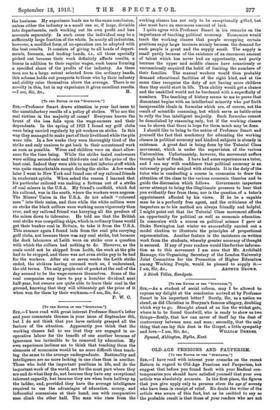[To THE EDITOR OF THE "SPECTATOR.'] SIR,—I have read with
great interest Professor Smart's letter and your comments thereon in your issue of September 6th, but I do not think that you have entirely grasped all the factors of the situation. Apparently you think that the working classes fail to see that they are engaged in co- operative labour for the benefit of one another because of ignorance too invincible to be removed by education. My own experience inclines me to think that teaching them the elements of economics would be no more difficult than teach- ing the same to the average undergraduate. Rationality and intelligence are no more lacking in one class than in another. Those who hold the important positions in life, and do the important work of the world, are for the most part where they are and do what they do, not because they have any exceptional inherent capacity, but because they are when born halfway up the ladder, and, provided they have the average intelligence required to use the advantages of education, money, and influential connexions at their hand, can with comparative ease climb the other half. The man who rises from the
working classes has not only to be exceptionally gifted, but also must have an enormous amount of luck.
I quite agree with Professor Smart in his remarks on the importance of teaching political economy. Economics would teach the working classes that people occupying certain positions enjoy large incomes mainly because the demand for such people is great and the supply small. The supply is small partly because of the existence of an enormous amount of talent which has never had an opportunity, and partly because the upper and middle classes have consciously or unconsciously acquired the habit of limiting the numbers of their families. The manual workers would then probably demand educational facilities of the right kind, and at the same time recognize the duty of not having more children than they could start in life. Thus ability would get a chance and the unskilled would not be burdened with a superfluity of numbers. The teaching of history seems to me to prove that discontent begins with an intellectual minority who put forth inexpressible ideals in formulae which are, of course, not the result of scientific reasoning, but which serve as battle-cries to rally the less intelligent majority. Such formulae cannot be demolished by reasoning only, but if the working classes can be shown that there is hope for them much may be done.
I should like to bring to the notice of Professor Smart and yourself the fact that machinery for educating the working classes in political economy and kindred subjects is already in existence. A great deal is being done by the Tutorial Class movement, which is under the supervision of the various Universities. Unfortunately, however, the movement suffers through lack of funds. I have had some experience as a tutor, and I can say with confidence that political economy is an extremely popular subject with students. It is the duty of the tutor who is conducting a course in economics to draw the attention of the class to the various economic theories and to guide the discussion which follows. Government inspectors never attempt to bring the illegitimate pressure to bear that you evidently fear from them, nor is the question of a tutor's appointment affected by his views. If he be a capable man he is a perfectly free agent, and the criticisms of the inspectors as to his method are always friendly and helpful. I might point out that the Tutorial Class movement afford' an opportunity for political as well as economic education. In connexion with a course on political science I gave at Stoke Newington last winter we successfully carried out a model election to illustrate the principles of proportional representation. Another feature is the insistence on written work from the students, whereby greater accuracy of thought is secured. If any of your readers would like further informa- tion as to this movement I am sure that Mr. Archibald Ramage, the Organizing Secretary of the London University Joint Committee for the Promotion of Higher Education among Working People, would be pleased to supply it.—










































 Previous page
Previous page